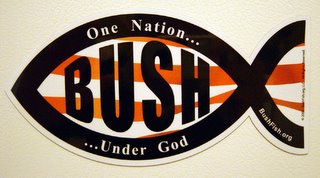Being a "postmodern" has granted a helpful (in my view) perspective on Questions and Answers. I have come to really value Questions. They are the fuel for reflection, indeed. I am reaching a stage in life where one of my favorite pastimes is to turn a meaningful question over and over in my head, looking at it from many

different perspectives. Equally, though, I have lost some respect for Answers. That is, I have lost respect for simplistic Answers. Growing in the practice of my reflective nature has uncovered for me the understanding of how few Questions there are which are not, in some way, linked to our own worldview and experience. But of course, this is a basic human truth, is it not?
What postmodernity has failed to do for me is map out an acceptable interaction between Questions and Answers. You see, I am not of the mindset that wisdom lies
only in the Questions (although there is much more there than I might have earlier thought!). Just as Answers which exist without Questions are not Answers at all (but rather arguments, propositional statements, claims, etc.), I would postulate that Questions are not meant to survive completely independently. Put simply, Questions and Answers exist symbiotically.
This is where my faith steps in. (And I should note it would be unreasonable for me to attribute all of my growing reflective nature to postmodernity...faith has, I believe, played some role there, too!) My gut-level sense is that Questions tend to live in two broad (and interactive) categories: pragmatic (
What time is it? What's your name? When is the bus to arrive?) and philosophical. As for the latter, such Questions can become quite intricate and profound, and there is a whiff of wisdom in believing that their intricateness and profundity suggests not only that a simplistic answer does them (or more accurately, the asker) violence, but that
any answer does. But my worldview won't support that, as following that track eventually leads me to a hopeless state of existentialism or nihilism. No, Christianity, once again holding competing truths together in tension, seems to me to suggest that both Questions and Answers can be simultaneously simple and profound.
In addition, our Western, fix-it world seems to be obsessed with the natural flow being
from Question
to Answer. (Or worse yet, from Answer to Answer, but that's another matter.) To me, the symbiotic relationship must necessarily flow from Answer to Question, as well.
And when I follow all of this progression in any line of thinking, I again and again find my Questions and Answers both beginning and ending with Jesus, and more specifically, with his cross. Jesus teaches me to ask the right Questions, to uncover, in my soul, what is r

eally there--even (especially?) when I don't really know, myself. Jesus invites me to explore the depths of who he is, and find satiation for some of my Questions...before introducing the next Questions to be asked. He
is the Answer. Yet he is not only the Answer, he is the Question. He is the Truth...and the Truth, I am finding, is Questions
and Answers.
In the surety of my relationship with him, I freely release my surety of other philosophies and wisdom. In the Answer of him, I am freed to ask Questions of him. In the conviction of his death on my behalf, I am released from the expectation of conviction. In this way, I am reborn. In this way, I am remade.











